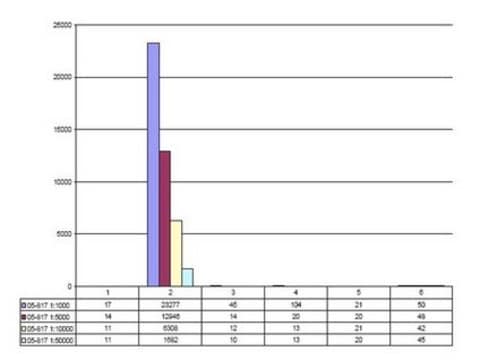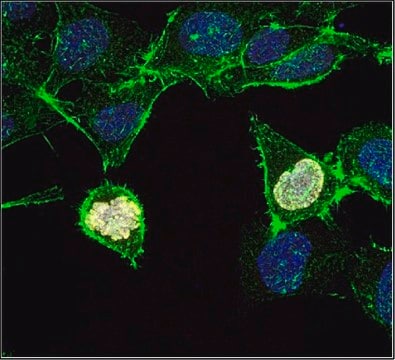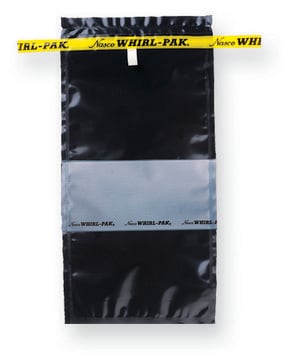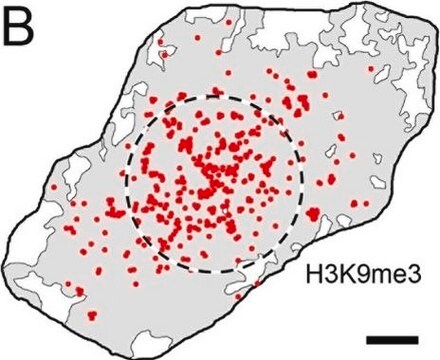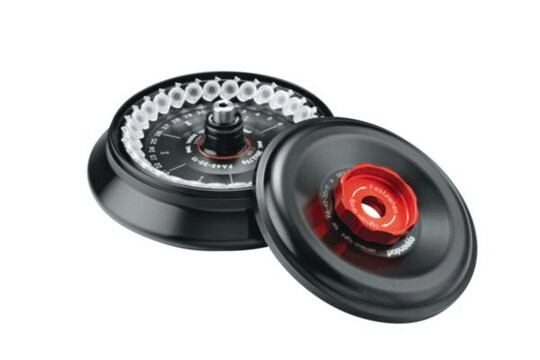Recommended Products
biological source
chicken
Quality Level
form
liquid
manufacturer/tradename
Chemicon®
concentration
100 μg/mL
technique(s)
ELISA: suitable
cell culture | mammalian: suitable
NCBI accession no.
UniProt accession no.
shipped in
dry ice
Gene Information
chicken ... NCAN(395493)
General description
Neurocan, chicken.
Product Source: Chicken Brain.
Application
Inhibition of cell-cell adhesion, cell-ECM adhesion or cell migration at:
0.1 to 30 micrograms / mL.
ELISA Assay: 0.05 to 5 micrograms / mL
Optimal working concentrations must be determined by the end user.
0.1 to 30 micrograms / mL.
ELISA Assay: 0.05 to 5 micrograms / mL
Optimal working concentrations must be determined by the end user.
Research Category
Neuroscience
Neuroscience
Research Sub Category
Neurodegenerative Diseases
Neurodegenerative Diseases
Physical form
Purified Neurocan in PBS. Contains no preservative.
Storage and Stability
Maintain at -20°C in undiluted aliquots for up to 12 months. Avoid repeated freeze/thaw cycles.
Analysis Note
A mix of Chondroitin Sulfate Proteoglycans from chick brain (Chemicon CC117) was purified by the unique density and size of this class of molecules. Neurocan is purified from this mix using an immobilized monoclonal antibody. The resulting neurocan is pure and has chondroitin sulfate attached. Removing the chondroitin sulfate with chondroitinase, results in core proteins are primarily the full-length 250 kD form and a little of smaller neurocan fragments.
Legal Information
CHEMICON is a registered trademark of Merck KGaA, Darmstadt, Germany
Disclaimer
Unless otherwise stated in our catalog or other company documentation accompanying the product(s), our products are intended for research use only and are not to be used for any other purpose, which includes but is not limited to, unauthorized commercial uses, in vitro diagnostic uses, ex vivo or in vivo therapeutic uses or any type of consumption or application to humans or animals.
Storage Class Code
12 - Non Combustible Liquids
WGK
WGK 2
Flash Point(F)
Not applicable
Flash Point(C)
Not applicable
Certificates of Analysis (COA)
Search for Certificates of Analysis (COA) by entering the products Lot/Batch Number. Lot and Batch Numbers can be found on a product’s label following the words ‘Lot’ or ‘Batch’.
Already Own This Product?
Find documentation for the products that you have recently purchased in the Document Library.
The interaction of the retina cell surface N-acetylgalactosaminylphosphotransferase with an endogenous proteoglycan ligand results in inhibition of cadherin-mediated adhesion.
Balsamo, J, et al.
The Journal of cell biology, 129, 1391-1401 (1995)
H Ernst et al.
Journal of cell science, 108 ( Pt 12), 3807-3816 (1995-12-01)
Chondroitin sulfate proteoglycans inhibit the adhesion of cells to extracellular matrix proteins that otherwise permit adhesion. Although proteoglycans are widely assumed to act by masking the other protein in a mixed substrate, recent studies suggest that proteoglycans inhibit adhesion through
E U Sumer et al.
Osteoarthritis and cartilage, 15(2), 212-221 (2006-09-26)
Aggrecan is the major proteoglycan in articular cartilage and is known to be degraded by various proteases, including matrix metalloproteinases (MMPs). The present study was undertaken to develop immunoassays detecting aggrecan and its fragments generated by MMP and non-MMP-mediated proteolysis.
Our team of scientists has experience in all areas of research including Life Science, Material Science, Chemical Synthesis, Chromatography, Analytical and many others.
Contact Technical Service
